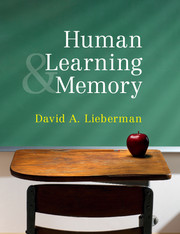Book contents
- Frontmatter
- Contents
- Figures
- Acknowledgments
- Introduction
- Part I Learning
- 1 Some basic assumptions
- 2 Classical conditioning
- 3 Conditioning principles and theories
- 4 Reinforcement
- 5 Reinforcement applications
- 6 Punishment
- 7 Theories of reinforcement
- Part II Memory
- Part III Learning and memory
- Glossary
- References
- Index
1 - Some basic assumptions
from Part I - Learning
- Frontmatter
- Contents
- Figures
- Acknowledgments
- Introduction
- Part I Learning
- 1 Some basic assumptions
- 2 Classical conditioning
- 3 Conditioning principles and theories
- 4 Reinforcement
- 5 Reinforcement applications
- 6 Punishment
- 7 Theories of reinforcement
- Part II Memory
- Part III Learning and memory
- Glossary
- References
- Index
Summary
In an early television series called Dragnet, police sergeant Joe Friday was forever being confronted by incoherent witnesses to a crime. He would stoically endure their babbling until, his patience finally exhausted, he would interrupt, “We want the facts, Ma'am, just the facts.” Psychologists too want the facts, but, with experience, they acquire a certain wary respect for the problems involved in determining facts. What is a fact? Of course everyone knows what a fact is; a fact is…, well…it's a fact, something that everyone knows to be true. Or is it? Was it a fact that the earth was flat because everyone before Columbus believed it to be so? Or that the earth was the center of the universe before Copernicus and Galileo moved it into orbit around the sun? And if we cannot be sure of the truth in cases as obvious as these (“Can't you feel that the earth is still? Can't you see that the sun is moving?”), how much more difficult must it be when the truth is more obscure, and when experts can't even agree among themselves? If one scientist claims that the moon is composed of blue cheese, and a colleague tartly replies, “So's your mother,” how are we to decide which of their scientific views is correct?
In older sciences, such as physics and chemistry, disputes over scientific facts are less obvious: Over the years, basic concepts such as the atom and gravity have become firmly established; only after considerable training to learn dispute-free “facts” are new initiates to the profession gradually introduced to the ambiguities and uncertainties of current research. In psychology, which is a relatively new science, these disputes cannot be obscured so easily: The dividing line between “old established facts” and “new controversial hypotheses” is less clear, and there is no comforting bedrock of certainty and accomplishment to support students when they feel overwhelmed by conflicting claims. Consider such a relatively simple problem as the use of corporal punishment: Is corporal punishment an effective and ultimately humane way to eliminate a person's harmful behavior, or is it a barbaric relic of our primitive past? There is evidence to support both views, and it can be more than a little frustrating to try to analyze the polemics of each side, and more than a little tempting to give up in disgust, crying “a plague on both your houses.”
- Type
- Chapter
- Information
- Learning and Memory , pp. 9 - 47Publisher: Cambridge University PressPrint publication year: 2011



